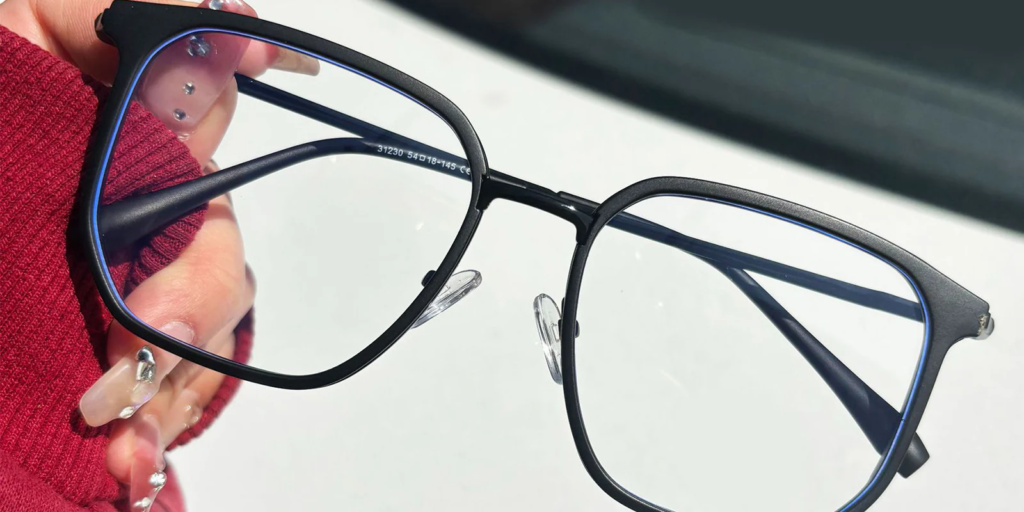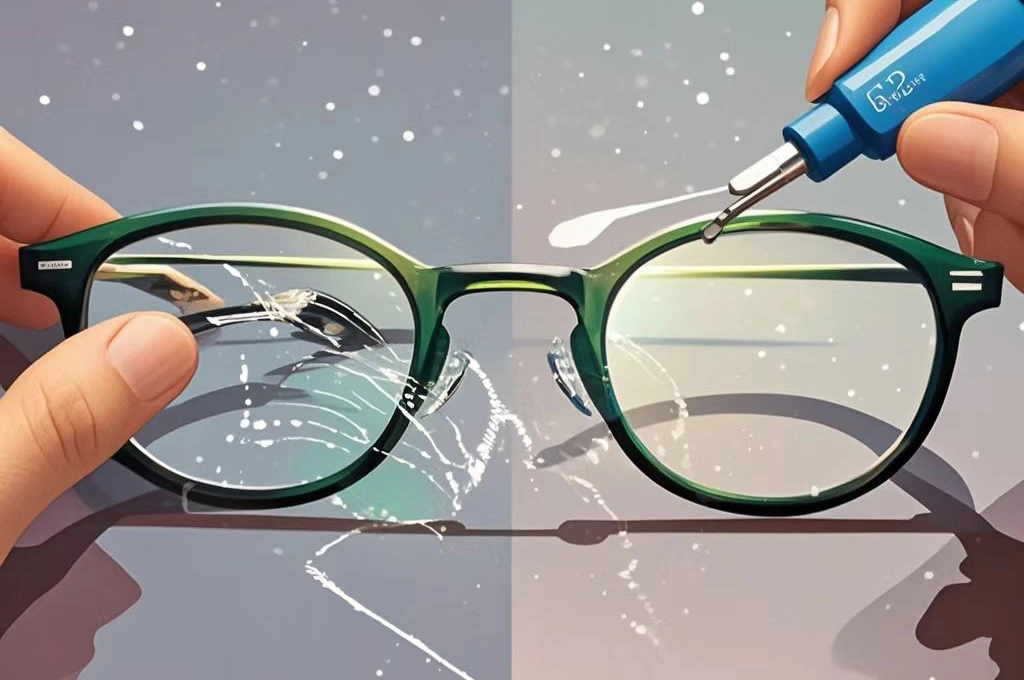If you wear glasses, you’ve probably experienced the annoyance of scratched lenses. Even a small scratch can affect your vision and make you feel uncomfortable. Whether you wear prescription glasses or sunglasses, scratches on the lenses not only reduce the function of your glasses, but also make your appearance look less neat. Fortunately, there are ways to repair minor scratches. This article will provide you with a range of practical methods, from simple home tips to professional product recommendations, to help you restore the clarity of your glasses and make them look brand new.
Table of Contents:
1. Why Scratches on Glasses Are a Problem
Scratches on glasses may seem like a small issue, but they can significantly impact both your vision and the longevity of your lenses. Even minor scratches can scatter light, leading to blurred vision and discomfort, especially when driving at night or working under bright lights. For those with prescription glasses, scratched lenses can interfere with your corrective vision, making it harder to focus and causing eye strain.
Cosmetically, scratches make your glasses look worn out and unkempt, which can detract from your overall appearance. For sunglasses, scratches may diminish the UV protection and affect your vision outdoors. The good news is, depending on the severity of the scratch, you may be able to fix or at least reduce the visibility of the damage.
2. Common Causes of Scratches on Glasses
Scratches can appear on your glasses for a variety of reasons, most of which are due to improper care or accidental damage. Some of the most common causes include:
- Not using a case: Placing your glasses in bags, pockets, or on rough surfaces without a protective case can easily lead to scratches.
- Improper cleaning: Wiping your lenses with tissues, paper towels, or clothing can cause fine scratches. These materials may seem soft, but they contain fibers that can be abrasive to lenses.
- Dust and dirt: If your lenses are dirty and you wipe them without rinsing off the debris first, those tiny particles can act like sandpaper on your lenses.
- Dropping your glasses: Accidents happen, but when glasses fall onto hard surfaces like concrete or asphalt, scratches are often the result.
- Leaving them in harsh environments: Extreme temperatures or environments with a lot of debris, like the beach, can contribute to scratches forming on your lenses.
Understanding the causes of scratches can help you prevent them in the future, ensuring your glasses stay clearer for longer.
3. Can You Really Remove Scratches from Glasses?
The ability to remove scratches from glasses depends on a few factors, including the material of your lenses, the severity of the scratch, and the coatings on the lenses. Minor surface scratches can often be reduced with home remedies or commercial products, but deep scratches are typically more challenging to remove.
It’s also important to note that if your lenses have protective coatings, such as anti-reflective or UV coatings, removing scratches can sometimes damage these layers. In some cases, the only solution for deep scratches or extensive damage may be to replace the lenses altogether. However, for light scratches, there are several DIY methods and products that may help restore the clarity of your glasses.
4. Step-by-Step Guide to Removing Scratches from Glasses
If you’re dealing with minor scratches, here’s a simple step-by-step process you can follow to try and minimize the damage:
- Clean your lenses: Before attempting to remove scratches, make sure your glasses are clean. Use a lens cleaner and a microfiber cloth to remove any dirt or debris that could cause further scratching.
- Choose a method: Select one of the scratch removal methods, whether it’s a home remedy or a commercial product. For light scratches, home solutions like toothpaste or baking soda can work well.
- Apply the solution: Using a soft cloth, gently apply the chosen solution to the scratched area. If using toothpaste, ensure it’s non-gel and non-abrasive. Rub the solution in small, circular motions over the scratch.
- Rinse and dry: After applying the solution, rinse the lenses thoroughly with water and dry them with a microfiber cloth.
- Assess the scratch: If the scratch is still visible, you can repeat the process. However, if the scratch is too deep, it may require professional repair or replacement.
5. Home Remedies for Minor Scratches on Glasses
Several home remedies can help reduce the visibility of minor scratches on your glasses. While these methods won’t fix deep scratches, they can improve the clarity of lightly scratched lenses.
- Toothpaste: One of the most popular methods is using non-abrasive, non-gel toothpaste. Apply a small amount to the lens and gently rub it in circular motions using a soft cloth. Rinse thoroughly afterward.
- Baking soda: Another common remedy is to make a paste with baking soda and water. Mix the two into a thick paste, apply to the lens, and rub gently. Afterward, rinse off with lukewarm water and dry with a microfiber cloth.
- Car wax or furniture polish: Some people find success using a small amount of car wax or furniture polish to temporarily fill in scratches. Apply a tiny amount, rub it in, and buff it off. Keep in mind that this is a temporary solution, and you’ll need to reapply occasionally.
While these remedies may reduce the visibility of scratches, they are not long-term solutions, especially for deeper scratches. If your lenses have a coating, be cautious, as these remedies can sometimes damage the protective layers.

6. Commercial Products to Remove Scratches from Glasses
If home remedies aren’t giving you the results you need, several commercial products are specifically designed to reduce or eliminate scratches on glasses. These products often contain mild abrasives or fillers that help minimize the appearance of scratches. Some popular options include:
- Lens polish kits: These kits come with solutions and buffing cloths specifically made to polish out minor scratches on lenses. They are a good choice for light scratches on both plastic and glass lenses.
- Scratch repair pens: These pens are designed to fill in scratches on lenses. They work similarly to scratch removers for cars, offering a temporary fix for visible damage.
- Professional lens polishers: For more significant damage, you might want to take your glasses to a professional who has access to more advanced polishing equipment. This can be especially useful for prescription lenses where precision is critical.
7. How to Prevent Scratches on Your Glasses
Prevention is the best way to avoid dealing with scratched lenses. Here are some tips to keep your glasses in top shape:
- Always use a case: When you’re not wearing your glasses, store them in a hard protective case. This prevents them from being exposed to dust, dirt, and potential damage.
- Clean with a microfiber cloth: Avoid using clothing, paper towels, or tissues to clean your lenses. Instead, use a microfiber cloth designed for glasses cleaning. Regularly rinse your glasses with water before wiping them to avoid rubbing dust or dirt into the lenses.
- Be mindful of placement: Don’t leave your glasses lens-down on any surface, as this can lead to scratches. Always place them with the lenses facing upward, and keep them away from rough or abrasive surfaces.
- Opt for scratch-resistant coatings: When purchasing new glasses, consider getting lenses with a scratch-resistant coating. While these coatings don’t make your glasses scratch-proof, they do add an extra layer of protection.
8. When to Replace Scratched Lenses
Sometimes, despite your best efforts, scratches can become too deep or numerous to fix. In such cases, replacing the lenses is the best option. If the scratches interfere with your vision or if you’re straining your eyes to see through damaged lenses, it’s time to replace them. Most opticians offer replacement lenses, which can be more cost-effective than buying a completely new pair of glasses.
Additionally, if your glasses have advanced coatings (like anti-glare or UV protection), deep scratches can compromise these protective layers. In these cases, replacing the lenses ensures that you continue to receive the benefits of your glasses, both for vision correction and eye protection.
9. Should You Try DIY Scratch Removal on Prescription Lenses?
While DIY scratch removal methods can be tempting, it’s important to be cautious when dealing with prescription lenses. Prescription lenses are often coated with specialized materials, such as anti-glare or UV coatings, that can be damaged by abrasive cleaning methods. If your lenses are heavily scratched or if you’re unsure whether DIY methods could cause more harm, it’s best to consult a professional optician.
For minor scratches, home remedies may be effective, but always test a small area first. If you’re using commercial products, make sure they are safe for prescription lenses to avoid compromising the effectiveness of your eyewear.
10. The Best Materials to Clean and Protect Your Glasses
Proper cleaning materials are essential for preventing scratches and keeping your glasses in top condition. Here’s what you should use:
- Microfiber cloth: These soft cloths are specifically designed for cleaning glasses and won’t scratch the lenses. Always keep one handy for cleaning throughout the day.
- Lens cleaning solution: Avoid using household cleaners on your glasses. Instead, invest in a cleaning solution designed for lenses, which is gentle and effective.
- Lens wipes: Pre-moistened lens wipes are great for quick cleaning on the go. Just make sure they are specifically for glasses to avoid using harsh chemicals.
Taking care of your glasses with the right tools and cleaning techniques will prevent scratches and help your lenses last longer.
Conclusion:
Although scratches may be annoying, you can reduce or eliminate their effects with some simple methods. Whether you choose a home solution or a professional repair product, the key is proper care and prevention. Regular cleaning, using the right protection methods, and promptly treating minor scratches will keep your glasses in top condition for a long time. If the scratch is too severe, don’t forget to consult a professional to ensure that your vision and the protective function of your glasses are not affected. Remember, taking the time to care for your glasses will not only extend their life, but also make your daily wearing experience more comfortable and clear.



